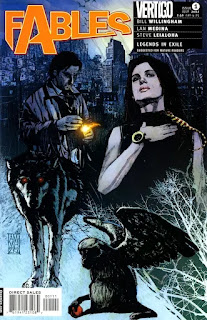Plus there's an even larger aspect that I'd actually kind of been thinking about lately. Here's a bit from Willingham's post...
When I first signed my creator-owned publishing contract with DC Comics, the company was run by honest men and women of integrity, who (for the most part) interpreted the details of that agreement fairly and above-board. When problems inevitably came up we worked it out, like reasonable men and women. Since then, over the span of twenty years or so, those people have left or been fired, to be replaced by a revolving door of strangers, of no measurable integrity, who now choose to interpret every facet of our contract in ways that only benefit DC Comics and its owner companies.You can find articles and podcasts and video essays pretty much daily these days talking about the ever-widening wealth gap between the richest and poorest, particularly in the US. You can readily find dozens of charts similar to the one below, pointing pretty clearly to a dramatic shift happening right around 1980 where the wealthiest people started get expoentially wealthier than literally everybody else.
When I first went to college, my school had around 35,000 students. I recognized at the time that my being only one of them was a drop in the bucket, and that by the time you got down far enough in the organization for someone to give a damn about me or my education, that person didn't have any real power. Sure, those who did have power wanted my money for tuition (technically, my parents' money) but that really wasn't all that much against the 34,999 other tuitions they would keep receiving if I ever said, "Screw you guys! I'm going home!" I knew I had no power or leverage to influence them in any way, shape, or form. That's a large part of why I never really had any school spirit or hold any deep association for my alma mater.
In the nearly three decades since then, I've never worked for a company with nearly as many as 35,000 employees. I think the largest had around 15,000 employees and the smallest maybe 50. At some employers, I never even knew what the owner looked like and at others I was on a first-name basis with them. But in every instance -- every single one -- my best interests were not their concern. At every company I've worked at, I've learned that no matter what the organizational structure or how I fit into it or how much I liked and got along with my co-workers, I was always, always, always secondary to making money. Now, my direct bosses may have liked me and tried to watch my back, but I've seen that change on a dime when a reorganization put me under someone else. Someone higher up the chain thought that the company would be more effecient (i.e. make more money) if things were structured differently and the people inevitably put in charge disagreed with my being there. Frequently because I didn't immediately start toeing the new/revised company line.
And that, basically, is what Willingham is talking about. Fables began publishing under DC in 2002. And the firings/replacements that Willingham alludes to follow a series of reorganizations that the company has undergone since then. DC Comics was made a subsidiary of DC Entertainment in 2009, an entirely new staff of publishers and executives were brought in in 2010, they moved from New York to California in 2015 forcing out a great many staffers in the process, corporate owner Warner Brothers reoganized in 2016 to put an even greater emphasis on film, ther was another reorganization in 2018 to increase emphasis on the individual branding and intellecutal properties over specific pieces of media, Warner Brothers merged with Discovery in 2021... The only reason anyone at DC even takes a call from Willingham at this point is essentially because they're legally obliged to.
It's sometimes said that the "original sin" of comics is how National screwed over Jerry Siegel and Joe Shuster back in 1938 when they bought Superman. While that lesson has no doubt helped many creators from completely getting shafted out of their creations, the lesson that those with money learned from that was to rig the game even more deliberately to make it virtually impossible to legally fight them just to get what you're contractually owed. Here, in 2023, there is no winning The American Dream any longer. Willingham had very smartly changed tactics upon realizing that; he's no longer playing to win, he's playing to not lose. It's obviously a completely different strategy and sadly, it's the only hope most of us have under late-stage ologarchic capitalism.









0 comments:
Post a Comment